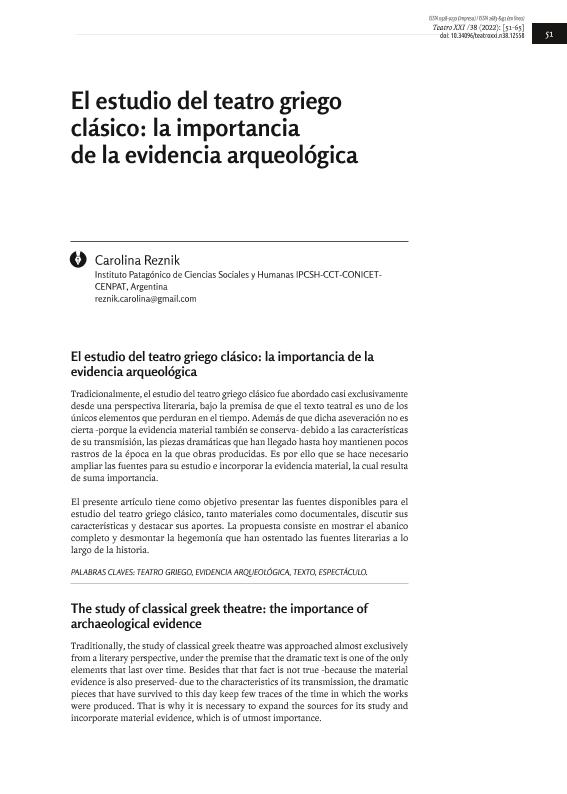Mostrar el registro sencillo del ítem
dc.contributor.author
Reznik, Carolina

dc.date.available
2023-08-03T09:57:47Z
dc.date.issued
2022-09
dc.identifier.citation
Reznik, Carolina; El estudio del teatro griego clásico: La importancia de la evidencia arqueológica; Universidad de Buenos Aires. Facultad de Filosofía y Letras. Instituto de Historia del Arte Argentino y Latinoamericano "Luis Ordaz"; Teatro XXI; 38; 9-2022; 51-65
dc.identifier.issn
0328-9230
dc.identifier.uri
http://hdl.handle.net/11336/206677
dc.description.abstract
Tradicionalmente, el estudio del teatro griego clásico fue abordado casi exclusivamente desde una perspectiva literaria, bajo la premisa de que el texto teatral es uno de los únicos elementos que perduran en el tiempo. Además de que dicha aseveración no es cierta -porque, como desarrollaremos en este trabajo, la evidencia material también se conserva- debido a las características de su transmisión, las piezas dramáticas que han llegado hasta hoy mantienen pocos rastros de la época en la que las obras fueron producidas. Es por ello que se hace necesario ampliar las fuentes para su estudio e incorporar la evidencia material, la cual resulta de suma importancia. El presente artículo tiene como objetivo presentar las fuentes disponibles para el estudio del teatro griego clásico, tanto materiales como documentales, discutir sus características y destacar sus aportes. La propuesta consiste en mostrar el abanico completo y desmontar la hegemonía que han ostentado las fuentes literarias a lo largo de la historia.
dc.description.abstract
Traditionally, the study of classical greek theatre was approached almost exclusively from a literary perspective, under the premise that the dramatic text is one of the only elements that last over time. Besides that that fact is not true -because the material evidence is also preserved- due to the characteristics of its transmission, the dramatic pieces that have survived to this day keep few traces of the time in which the works were produced. That is why it is necessary to expand the sources for its study and incorporate material evidence, which is of utmost importance.The present article aims to present the sources available for the study of classical greek theatre, both material and textual, discuss its characteristics and highlight its contributions. The proposal consists of showing the complete range and dismantling the hegemony that literary sources have held throughout history.
dc.format
application/pdf
dc.language.iso
spa
dc.publisher
Universidad de Buenos Aires. Facultad de Filosofía y Letras. Instituto de Historia del Arte Argentino y Latinoamericano "Luis Ordaz"
dc.rights
info:eu-repo/semantics/openAccess
dc.rights.uri
https://creativecommons.org/licenses/by-sa/2.5/ar/
dc.subject
TEATRO GRIEGO
dc.subject
EVIDENCIA ARQUOLÓGICA
dc.subject
TEXTO
dc.subject
ESPECTÁCULO
dc.subject.classification
Otras Historia y Arqueología

dc.subject.classification
Historia y Arqueología

dc.subject.classification
HUMANIDADES

dc.title
El estudio del teatro griego clásico: La importancia de la evidencia arqueológica
dc.title
The study of classical greek theatre: the importance of archaeological evidence
dc.type
info:eu-repo/semantics/article
dc.type
info:ar-repo/semantics/artículo
dc.type
info:eu-repo/semantics/publishedVersion
dc.date.updated
2023-07-07T21:35:13Z
dc.journal.number
38
dc.journal.pagination
51-65
dc.journal.pais
Argentina

dc.description.fil
Fil: Reznik, Carolina. Consejo Nacional de Investigaciones Científicas y Técnicas. Centro Científico Tecnológico Conicet - Centro Nacional Patagónico. Instituto Patagónico de Ciencias Sociales y Humanas; Argentina
dc.journal.title
Teatro XXI
dc.relation.alternativeid
info:eu-repo/semantics/altIdentifier/doi/https://doi.org/10.34096/teatroxxi.n38.12558
Archivos asociados
